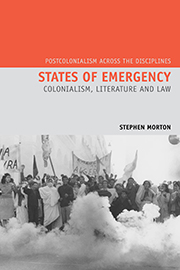Book contents
- Frontmatter
- Contents
- A Note on Translations
- Acknowledgements
- Introduction
- Part I
- Part II
- 3 States of Emergency, the Apartheid Legal Order and the Tradition of the Oppressed in South African Fiction
- 4 Torture, Indefinite Detention and the Colonial State of Emergency in Kenya
- 5 Narratives of Torture and Trauma in Algeria's Colonial State of Exception
- Part III
- Conclusion
- Bibliography
- Index
4 - Torture, Indefinite Detention and the Colonial State of Emergency in Kenya
from Part II
- Frontmatter
- Contents
- A Note on Translations
- Acknowledgements
- Introduction
- Part I
- Part II
- 3 States of Emergency, the Apartheid Legal Order and the Tradition of the Oppressed in South African Fiction
- 4 Torture, Indefinite Detention and the Colonial State of Emergency in Kenya
- 5 Narratives of Torture and Trauma in Algeria's Colonial State of Exception
- Part III
- Conclusion
- Bibliography
- Index
Summary
In June 2009 the London lawyers Leigh Day filed a legal case against the British government on behalf of five Kenyans representing the Mau Mau Veterans' Association for atrocities and human rights violations committed during the state of emergency in Kenya between 1952 and 1960. In a letter addressed to the then British Prime Minister, Gordon Brown, the former detainees begin by invoking the Kikuyu proverb ‘Muingatwo na kihoto dacokago; muingatwo na njuguma niacokaga’ (‘He who is defeated with unjust force will always come back, he who is dealt with justly will never come back’). By framing their demand for justice within the rhetorical structure of a Kikuyu proverb, the detainees situate their public address to the British government within the ethical and legal frame of reference of Kikuyu society. In so doing, the proverb legitimates the detainees’ claim with reference to the legal values and codes of Kikuyu society and culture, and defines the authority of the former detainees as legal subjects with the right to address the figure of British parliamentary sovereignty, the prime minister. In the letter, the former detainees proceed to explain how they are Kenyans in their 70s and 80s who have travelled to London from ‘our rural villages to tell the world of the torture and trauma we have lived through at the hands of the British colonial regime’.
- Type
- Chapter
- Information
- States of EmergencyColonialism, Literature and Law, pp. 119 - 145Publisher: Liverpool University PressPrint publication year: 2013



